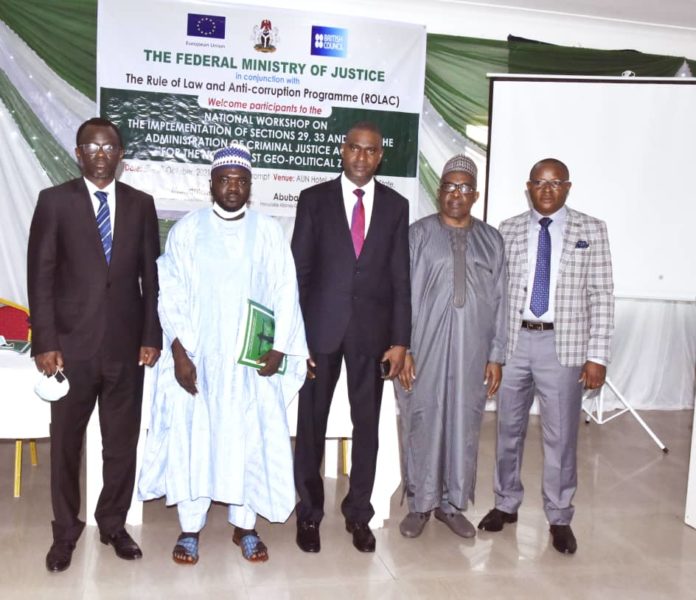
The Acting Solicitor General of the Federation/ Permanent Secretary Federal Ministry of Justice, Mr Umar Etsu Mohammed has described domestication of the Administration of Criminal Justice Act ( ACJA 2015) as capable of enhancing cross-sector collaboration amongst stakeholders in the Justice administration.
According to him, the ACJA provisions was aimed at promoting access to Justice and reduction of human rights abuses.
Mohammed stated this while declaring open the National Workshop on Implementation of Administration of Criminal Justice Act, 2015 held on Tuesday 5th October, 2022 in Yola, Adamawa State.
The workshop which is funded by the European Union (EU) for the North-East Geo-political zone, is the Fourth in the series of such trainings in the country.
Participants and stakeholders at the workshop were drawn from the Nigerian Police Force (NPF), Nigerian Correctional Services (NCS), Department of State Security (DSS), National Drugs Law Enforcement Agency (NDLEA), Nigerian Security and Civil Defence Serivices ( NSCDC), Legal Aid Council (LAC), Ministry of Justice and Magistrates from the States of Adamawa, Bauchi, Borno, Gombe, Taraba and Yobe State.
Represented by the Director of Public Prosecution (DPP), Federal Ministry of Justice, Mr Mohammed Abubakar, the SGF who doubles as the host at the programme reiterated that the Federal Government will through the Federal Justice Sector Reform Coordinating Committee (FJSRCC) continue to lead the efforts towards reforming Criminal Justice Administration and promotion of the rule of law.
He said, ” Following the validation and adoption of the reporting templates and arrest protocol at the National Workshop held in November, 2018 in Abuja by the heads of the various Justice sectors institutions involved in criminal justice administration led by the Chief Justice of Nigeria, it became imperative to train those saddled with the responsibility of actual implementation of the Act.
” The Act has provided a broad legal framework for a more effective cross-sector collaboration and oversight between and amongst agencies in criminal justice administration and the protection of the rights of citizens”.
“Section 29(1) of the Act Provides a mechanism for interface between the inspector General of Police and the Attorney General of the Federation as well the commissioner of Police and the Attorney General of the state.The Section requires the inspector General of Police to remit Quarterly to the Attorney General of the Federation a record of all arrests made with or without warrant in relation to federal offenses within Nigeria while Section 29(2) requires the Commissioner of Police of a state or head of agency authorized to make arrests to remit quarterly to the Attorney General of the state records of arrest with respect to state offenses.
Section 33 of the Act requires an officer in charge of a police Station or an officer in charge of an agency authorized to make arrests to on the last working day of every month report to Magistate the cases of all Suspects arrested without Warrant Within the limits of their respective stations or agency whether the suspects have been admitted to bail or not .The content of such report is Provided in Section 15 of the Act.
Section 34 of the Act requires a Chief Magistrate or a Magistrate designated by the Chief judge of the state to Conduct an inspection of Police Stations or other Places of detention within his territorial jurisdiction other than the Prison.
The above Provision also requires the Chief Magistrate to submit the report from the officer in charge of a Police Station to the Criminal justice Monitoring Committee who is expected to analyze the reports and advise the Attorney General of the Federation and AG of state accordingly,”
he added .
In his opening Speech, the Secretary FJSRCC Mr Felix Ota-Okojie noted that the workshop being organized across the Geopolitical Zones was to keep Stakeholders with ACJA Provisions and how to go about its implementation.
Also in a Short Speech,the Special Assistance to The AGF on Media and Public Relations, Dr Jibrin Umar Gwandu said the workshop will increase stakeholders skills in handling human abuses related matters in their jurisdictions.
Giving a speech, the Co-Chairman at the workshop, Professor Tabiu Muhammed lauded ACJA, saying its introduction was changing the Justice System, assuring that it would further help curbed some of the challenges.
While identifying implementation as key challenge, Mohammed stated that the monitoring mechanism will not only bring Stakeholders to the same table but will also enable them identify tools to use to achieve set goals.
In a brief remarks, the Component Manager, Rule of Law Anti-Corruption Programme ( RoLAC), Dr. Oluwatoyin Badejogbin expressed worry at the rate at which citizens rights are being trampled by law enforcement agencies.
He then lauded the federal government for identifying key elements in ACJA implementation, stressing the need for an enduring partnership and interface.
Abdullahi Aminu
For: Deputy Director, Information





